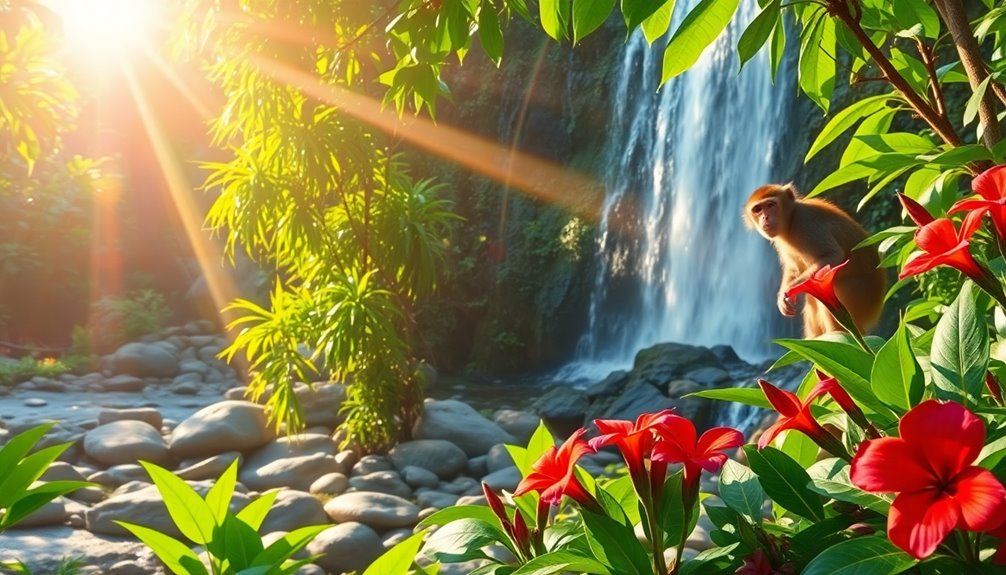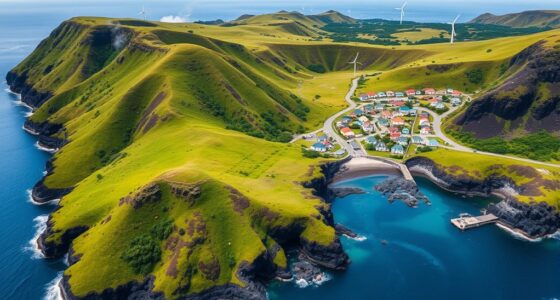Unveiling Thailand's eco-friendly secrets is all about connection and sustainability. You can explore biodiversity in Doi Inthanon National Park or enjoy eco-friendly kayaking in Khao Sok. Use local public transportation to navigate Bangkok easily while supporting reduced emissions. Check out community-led reforestation projects, where locals are planting trees and restoring nature. You'll find authentic crafts in local markets, enabling cultural exchange while contributing to the economy. By choosing these sustainable options, you not only experience Thailand's beauty but also support its preservation. Stick around, and you'll uncover even more ways to make your trip environmentally conscious.
Key Takeaways
- Explore Doi Inthanon National Park for breathtaking waterfalls and diverse ecosystems that promote eco-tourism and biodiversity conservation efforts.
- Utilize Bangkok's public transport options, like the BTS Skytrain and MRT, to reduce emissions while enjoying affordable travel around the city.
- Participate in eco-friendly kayaking in Khao Sok National Park, where guided tours support local communities and wildlife conservation initiatives.
- Discover authentic local crafts at Chiang Mai's Sunday Walking Street, directly supporting artisans and preserving traditional cultural practices.
- Engage in community-led reforestation projects to enhance biodiversity and support sustainable livelihoods while enjoying Thailand's natural beauty.
Introduction
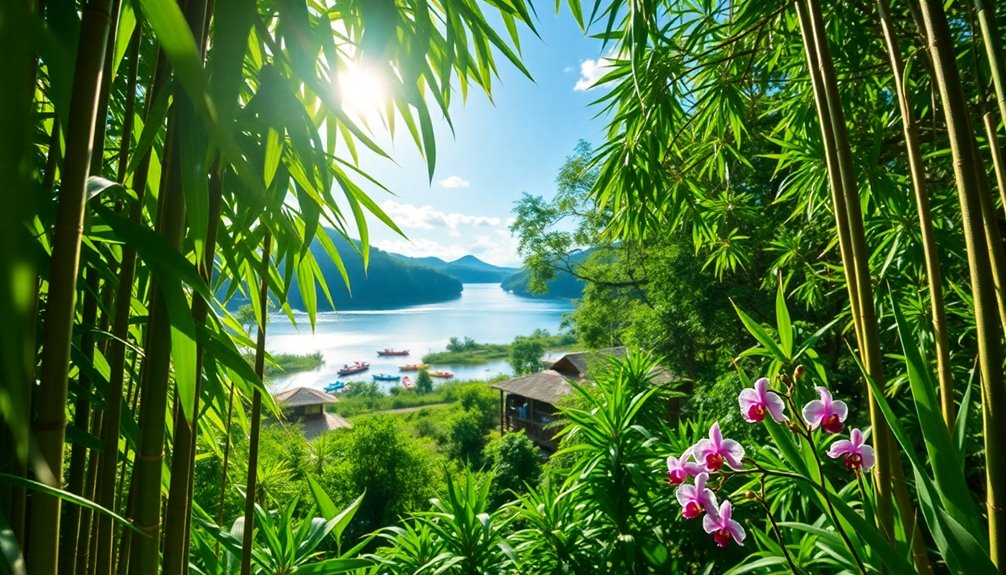
When you think of Thailand, breathtaking biodiversity and stunning landscapes come to mind.
By exploring its eco-friendly initiatives, you can help preserve the country's unique ecosystems while enjoying its natural beauty.
Let's uncover how your travel choices can contribute to protecting this remarkable environment.
Breathtaking Biodiversity and Landscapes
As you explore Thailand, you'll discover a land bursting with breathtaking biodiversity and stunning landscapes that captivate the senses.
From the majestic waterfalls of Doi Inthanon National Park to the vibrant pink lotus flowers of the Red Lotus Sea in Udon Thani, nature lovers will find endless beauty. The diverse landscapes offer exciting opportunities for trekking and eco-tourism, allowing you to immerse yourself in the rich biological diversity.
Don't miss the pristine beaches of Koh Kood, where untouched natural surroundings invite relaxation and adventure. You can even take boat rides through the Talay Bua Daeng, experiencing a unique aquatic ecosystem that highlights Thailand's ecological significance.
This country truly is a paradise for those who cherish nature.
Preserve Thailand's Unique Ecosystems
Preserving Thailand's unique ecosystems is crucial, not only for the diverse wildlife that thrives within them but also for the rich cultural heritage of local communities.
By embracing eco-friendly tourism, you can support conservation efforts that protect the country's rainforests, coral reefs, and mangrove forests.
Explore national parks like Khao Sok and Doi Inthanon, where you can witness stunning biodiversity while engaging in responsible travel practices.
The marine ecosystems around islands such as Koh Kood and Koh Chang are home to endangered species, making their protection vital.
When you choose sustainable options, you contribute to the well-being of local communities, ensuring that their traditions endure alongside the preservation of Thailand's extraordinary natural landscapes.
Travel From Bangkok to Islands

If you want to skip the long journey and head straight to Thailand's stunning islands, you can fly direct from major cities like London and Sydney.
These flights make it easy to reach paradise without the hassle of multiple transfers.
Once you arrive, don't miss the chance to hop on a tuk-tuk for a local ride and soak in the vibrant atmosphere.
Fly Direct to Thailand's Islands
When you're ready to escape to Thailand's breathtaking islands, flying direct from Bangkok is your best option. Instead of long journeys, you'll reach stunning destinations like Koh Samui quickly while supporting eco-friendly travel.
Here's why direct flights are the way to go:
- Reduced Travel Time: Skip long layovers and enjoy more time on the islands.
- Convenient Options: Airlines like Bangkok Airways and Thai Airways offer multiple daily flights.
- Sustainable Practices: Koh Samui International Airport promotes sustainable tourism with eco-friendly initiatives.
- Lower Carbon Footprint: Direct flights help minimize carbon footprints compared to longer land and sea travel.
Direct Flights From London
Wondering how to seamlessly reach Thailand's stunning islands from London? You'll be pleased to know that direct flights from London to Bangkok are offered by various airlines, making your journey effortless.
Once you land in Bangkok, you can quickly hop on a domestic flight to popular islands like Koh Samui, Phuket, or Koh Lanta—all just 1 to 2 hours away. Suvarnabhumi Airport is a major hub for eco-tourists, providing frequent connections that facilitate your travels.
Airlines like Thai Airways and Bangkok Airways even promote sustainable travel practices, ensuring your trip is eco-friendly. Immerse yourself in the vibrant local culture and admire the natural beauty of Thailand's islands, all easily accessible within hours of your arrival in Bangkok.
Direct Flights From Sydney
Direct flights from Sydney to Bangkok are your gateway to Thailand's breathtaking islands.
With airlines like Thai Airways and Qantas, reaching Bangkok is a breeze. Once there, you can hop on low-cost domestic flights to stunning destinations.
Here's what you can explore:
- Koh Kood – A tranquil escape known for its pristine beauty.
- Koh Chang – Perfect for those seeking eco-friendly accommodations.
- Koh Samui – Offers sustainable practices in many resorts.
- Trat Airport – The launchpad for a short boat ride to Koh Kood.
Embrace eco-friendly accommodations that prioritize sustainable practices, steering clear of mass tourism.
Your adventure in Thailand is just a flight away!
Tuk-Tuk Rides for Locals
Why not embrace the charm of Bangkok by hopping on a tuk-tuk for your travels?
These vibrant, eco-friendly vehicles offer a unique local way to navigate the bustling streets. Tuk-tuks aren't only an iconic representation of Thai culture, but they also provide a cost-effective transportation option, with fares ranging from 20 to 100 baht.
Plus, you'll contribute to reducing carbon emissions, as their smaller size consumes less fuel than larger vehicles.
If you're itching to escape to nearby islands like Koh Chang or Koh Kood, tuk-tuks can take you to bus terminals or piers for your onward journey.
Enjoy the ride and soak in the sights while embracing this essential part of Bangkok's charm!
Sustainable Wildlife Encounters

If you're looking for unforgettable wildlife encounters in Thailand, you can explore wildlife-friendly trekking adventures that respect natural habitats.
Eco-friendly kayaking trips let you glide through stunning landscapes while observing local ecosystems up close.
Plus, staying in solar-powered guesthouses ensures your travels support sustainable practices.
Wildlife-Friendly Trekking Adventures
Have you ever dreamed of exploring breathtaking landscapes while encountering wildlife in its natural habitat? Thailand offers incredible wildlife-friendly trekking adventures that connect you with diverse wildlife while supporting the local community.
Here are some ways to enjoy responsible tourism practices:
- Trek in Khao Sok National Park to spot endangered species like the Malayan sun bear and Asian elephant.
- Explore Chiang Mai's jungles to see gibbons and hornbills, promoting sustainable wildlife encounters.
- Visit ethically-run elephant sanctuaries near Chiang Mai for hands-on experiences emphasizing conservation.
- Participate in wildlife conservation projects, such as habitat restoration, to engage directly with local ecosystems.
Additionally, consider maintaining a clean air environment during your trekking adventures to enhance your overall experience and well-being. These eco-friendly tourism options not only enrich your journey but also contribute to wildlife protection efforts.
Eco-Friendly Kayaking Adventures
Kayaking through Thailand's stunning waterways offers an unforgettable way to connect with nature while promoting eco-friendly practices.
Paddle through Khao Sok National Park's mangrove forests, where you'll spot monitor lizards, kingfishers, and vibrant fish species in their natural habitat.
Opt for guided kayaking tours that support local communities and emphasize conservation—like those in Koh Kood—where you'll learn about the region's ecological significance.
Experience the breathtaking Red Lotus Sea from November to February, navigating through blooming pink lotus flowers while observing migratory birds.
Many eco-friendly kayaking excursions also incorporate beach clean-up activities, allowing you to contribute to environmental preservation and appreciate Thailand's gorgeous coastlines.
Embrace sustainable practices while enjoying the incredible wildlife and natural beauty that surrounds you.
Solar-Powered Guesthouses
Exploring Thailand's waterways sets the stage for discovering sustainable accommodation options that further enhance your eco-friendly journey.
Solar-powered guesthouses are an excellent choice for eco-conscious travelers looking to support conservation and local wildlife.
Here are some benefits of these eco-friendly stays:
- Reduce Carbon Footprint: Solar-powered systems minimize environmental impact.
- Support Local Wildlife: Guesthouses prioritize conservation efforts, allowing responsible wildlife encounters.
- Enhance Biodiversity Experiences: Many are located near protected areas, offering guided eco-tours.
- Sustainable Tourism Practices: Rainwater harvesting and waste management systems improve comfort while promoting sustainability.
Utilize Local Public Transportation
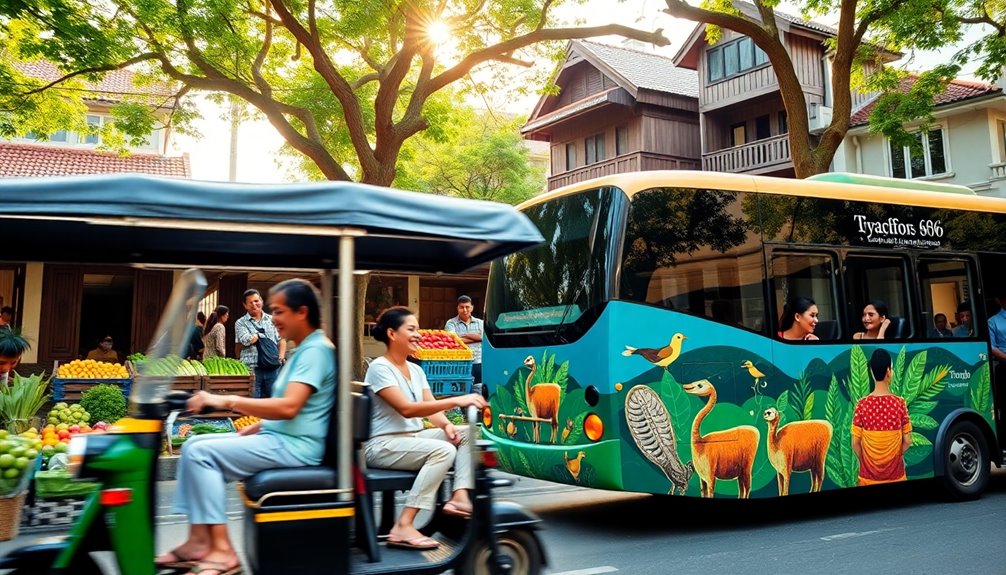
While you're wandering through Thailand, utilizing local public transportation can significantly enhance your travel experience.
With a network of buses, trains, and ferries, you'll find eco-friendly options that make navigating the country affordable and enjoyable. In Bangkok, the BTS Skytrain and MRT subway offer efficient, air-conditioned rides, reducing reliance on cars and minimizing carbon emissions.
You can hop on a local songthaew, which provides communal transport, letting you engage with local life while promoting sustainable tourism.
Train journeys to destinations like Chiang Mai and Ayutthaya encourage slow travel, allowing you to appreciate the stunning landscapes.
Community-Led Reforestation Projects
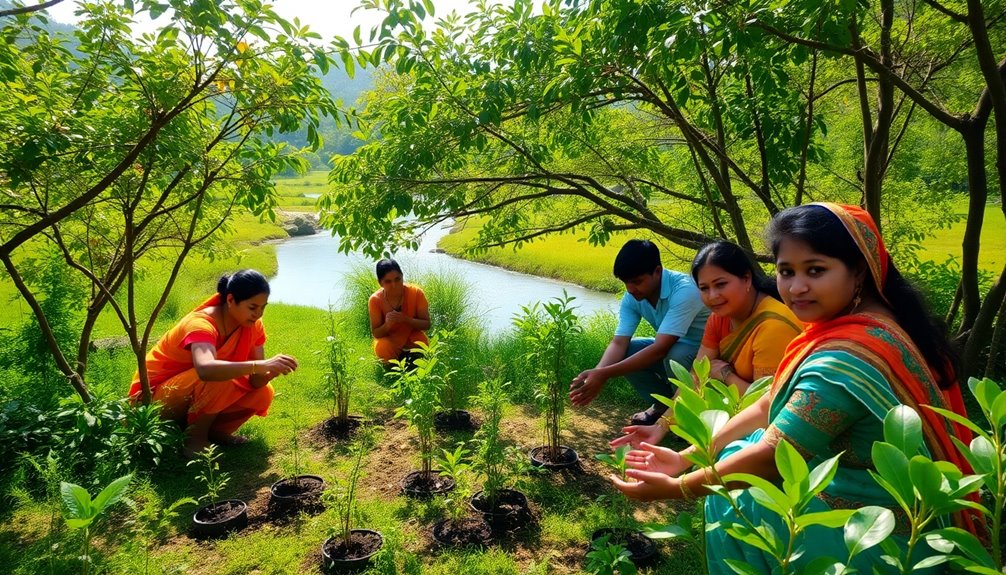
In Thailand, community-led reforestation projects are flourishing thanks to the combined efforts of local residents, NGOs, and government initiatives.
By planting native trees and restoring habitats, these projects not only enhance biodiversity but also support sustainable livelihoods for the community.
You'll find that engaging in these efforts fosters a strong sense of cultural sustainability and environmental stewardship.
Government and NGO Efforts
Community-led reforestation projects in Thailand play a crucial role in restoring biodiversity and combating deforestation, driven by both government initiatives and NGO collaborations.
You'll find that these efforts focus on sustainable practices to engage local communities effectively. Here are some key aspects:
- The Thai government aims to increase forest cover from 32% to 40% by 2037, fostering grassroots conservation.
- NGOs like the Forest Restoration Research Unit (FORRU) work with locals to develop sustainable agroforestry.
- The "Tree Bank" initiative rewards communities for planting and caring for trees, financially supporting their efforts.
- Successful projects, such as in Khon Kaen, have seen over 1 million trees planted by volunteers, significantly enhancing local ecosystems.
Community and Cultural Sustainability
Reforestation efforts in Thailand are deeply intertwined with community and cultural sustainability, reflecting the commitment of local residents to restore their environment. Projects like the "Tree for Life" program in Chiang Mai engage locals, enhancing biodiversity while providing sustainable livelihoods through eco-tourism.
Here's a quick look at the impact of these initiatives:
| Aspect | Details |
|---|---|
| Community Involvement | Over 1,000 residents involved |
| Trees Planted | More than 100,000 native trees |
| Economic Benefits | Sustainable livelihoods through forest products |
| Educational Efforts | Workshops in schools raising conservation awareness |
Dry Season for Eco-Tourism
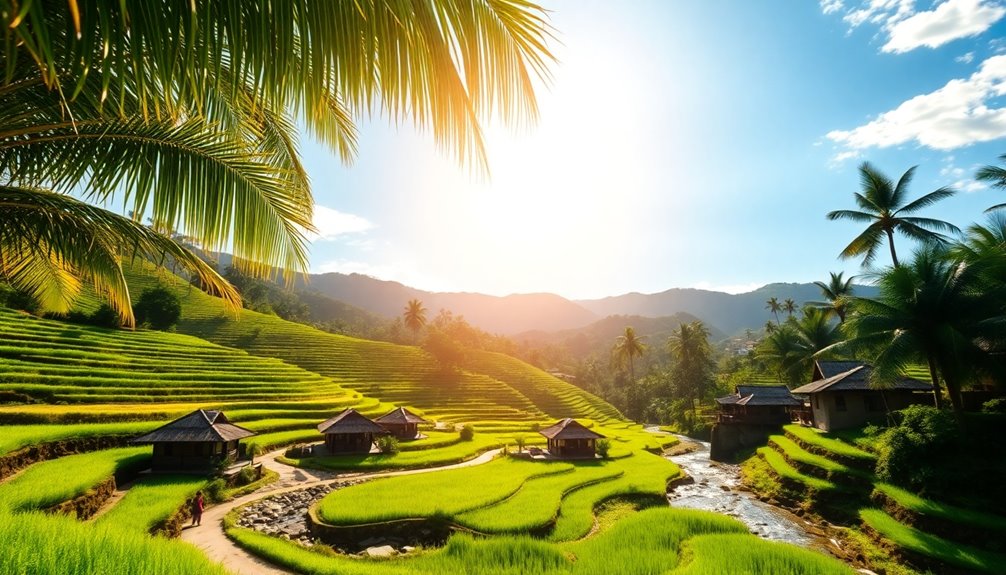
Thailand's dry season, running from November to April, is your best bet for peak wildlife viewing.
You'll find vibrant ecosystems alive with migratory birds and other wildlife, perfect for nature lovers.
Plus, with clear skies and pleasant temperatures, outdoor activities like snorkeling and trekking become even more enjoyable.
Peak Wildlife Viewing Months
As the dry season sets in from November to April, you'll find that wildlife viewing in Thailand reaches its peak. During this time, animals are more active and easier to spot, making it an ideal period for eco-tourism activities.
Here are some highlights:
- Khao Sok National Park: Explore diverse ecosystems, spotting elephants and gibbons.
- Red Lotus Sea: Birdwatching enthusiasts will love the migratory birds among blooming pink lotus flowers.
- Kaeng Krachan National Park: Witness various bird species in their natural habitats.
- Koh Tao: Enjoy clearer visibility in marine environments, perfect for snorkeling and diving.
This dry season offers a vibrant backdrop for wildlife photography and unforgettable experiences in Thailand's natural wonders.
Monsoon Season Travel Tips
While many travelers shy away from the monsoon season, this period from May to October offers a unique opportunity to experience Thailand's natural beauty without the crowds.
Lush landscapes thrive, especially in eco-tourism hotspots like Khao Sok National Park. Embrace responsible travel by exploring affordable eco-friendly resorts, which often provide lower accommodation prices during this time.
Engage in community-based tourism, such as volunteering or participating in local conservation efforts, to support sustainable practices while immersing yourself in authentic Thai culture.
Don't miss out on activities like kayaking through mangrove forests, made more accessible by the season's rains.
With fewer tourists around, you'll enjoy a more intimate connection with Thailand's vibrant ecosystems and charming communities. Additionally, remember to be cautious of local wildlife, particularly regarding tick removal practices if you encounter them during your adventures.
How to Make Your Trip More Sustainable
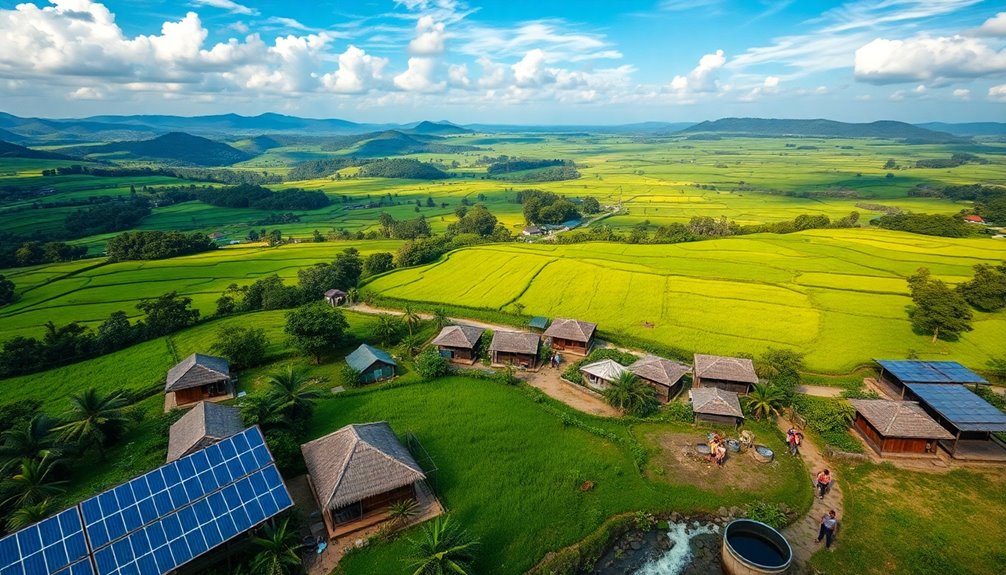
To make your trip more sustainable, consider using biodegradable toiletries and utensils that minimize waste.
Supporting local artisans by purchasing their crafts not only helps the economy but also gives you a unique souvenir to remember your travels.
Biodegradable Toiletries and Utensils
Choosing biodegradable toiletries and utensils can make a significant difference during your travels in Thailand. Not only do they promote responsible tourism, but they also help reduce your environmental impact.
Here are some tips to embrace this eco-friendly approach:
- Opt for biodegradable toiletries like bamboo toothbrushes and natural soaps, often found in eco-friendly accommodations.
- Seek out sustainable dining options that use biodegradable utensils made from palm leaves or bamboo.
- Purchase biodegradable products at local markets to support local artisans and the economy.
- Embrace hotels that provide complimentary biodegradable toiletries, reinforcing your commitment to sustainability.
Support Local Artisans' Crafts
Supporting local artisans' crafts not only enriches your travel experience but also strengthens the communities you visit. When you support local artisans, you help preserve traditional crafts and contribute to sustainable livelihoods.
Seek out handmade items like silk textiles from Chiang Mai, bamboo crafts from northern villages, or pottery from Sukhothai, all showcasing unique artistry. Participating in workshops, such as pottery or weaving classes, gives you a chance to engage directly with artisans, fostering cultural exchange.
Markets like the Sunday Walking Street in Chiang Mai offer an authentic shopping experience, featuring eco-friendly crafts made from recycled or sustainably sourced materials. By choosing these products, you actively promote responsible tourism and minimize your environmental impact.
Frequently Asked Questions
What Are the Best Eco-Friendly Accommodations in Thailand?
When you're searching for the best eco-friendly accommodations in Thailand, consider staying at places like the Elephant Hills Camp in Khao Sok or the Eco Resort in Chiang Mai.
These spots focus on sustainability and often use renewable energy sources. You'll find unique experiences, from treehouses to beachfront bungalows, all designed to minimize environmental impact.
Plus, you'll enjoy connecting with nature while supporting local communities and conservation efforts during your stay.
How Can I Minimize Plastic Use During My Trip?
They say, "Every little bit helps," and when it comes to minimizing plastic use on your trip, that couldn't be truer.
Start by carrying a reusable water bottle and refill it wherever you go. Opt for cloth bags for shopping instead of plastic ones, and choose restaurants that use minimal packaging.
Bring your own utensils and straws, and say no to single-use items. Together, these small changes can make a big difference in protecting the environment.
Are There Eco-Friendly Tours Available in Chiang Mai?
Yes, there are plenty of eco-friendly tours available in Chiang Mai!
You can explore the lush jungles, visit ethical elephant sanctuaries, or take part in organic farming experiences. Many local operators focus on sustainability, ensuring minimal environmental impact.
When you book a tour, just look for those that prioritize eco-conscious practices. You'll not only enjoy the beauty of the area but also contribute to its preservation.
It's a win-win for you and the environment!
What Local Foods Are Sustainable and Ethical to Try?
Did you know that over 90% of Thailand's agriculture is small-scale, often organic?
When you're in Chiang Mai, try local dishes like Khao Soi, made from sustainably sourced ingredients, or Som Tum, featuring fresh, locally-grown papaya.
Don't miss out on organic rice, often harvested with traditional methods that respect the environment.
By choosing these dishes, you support local farmers and promote sustainable practices while enjoying authentic Thai flavors.
You won't regret it!
How Can I Support Local Artisans While Traveling?
To support local artisans while traveling, you can start by visiting local markets and shops that showcase handmade goods.
Look for items crafted using traditional methods, and don't hesitate to ask artisans about their techniques and stories. Purchasing directly from them ensures your support goes to the local community.
You might also consider participating in workshops to learn skills firsthand, fostering a deeper connection to the culture and the people behind the crafts.
Conclusion
In Thailand, your eco-friendly journey can be nothing short of legendary! By embracing sustainable practices, you're not just exploring a paradise, you're becoming part of a movement that protects its stunning beauty for generations to come. Every choice you make—from traveling by local transport to supporting community projects—helps preserve this vibrant ecosystem. So pack your bags, tread lightly, and let Thailand's hidden gems inspire you to create unforgettable memories while making a positive impact.

